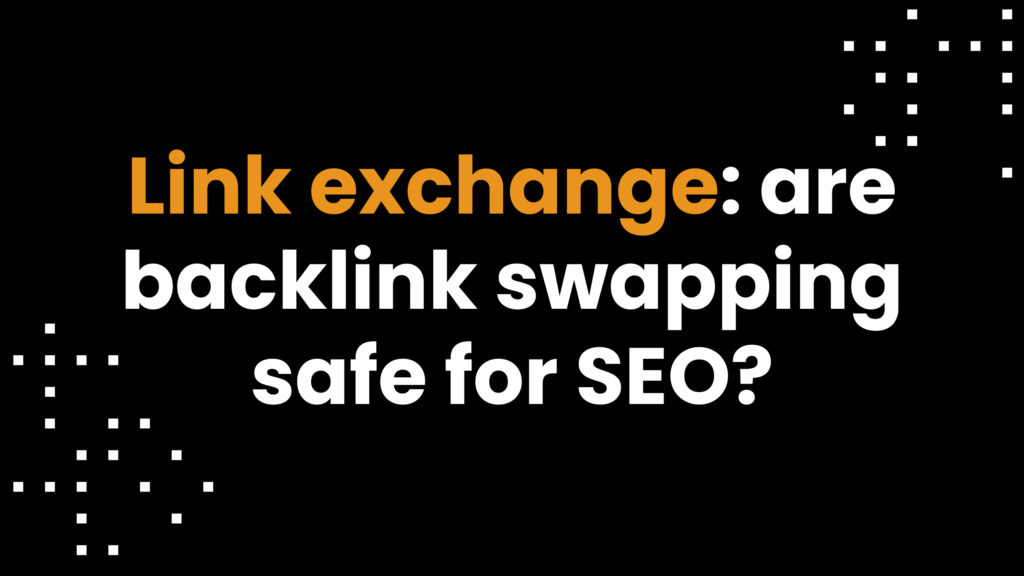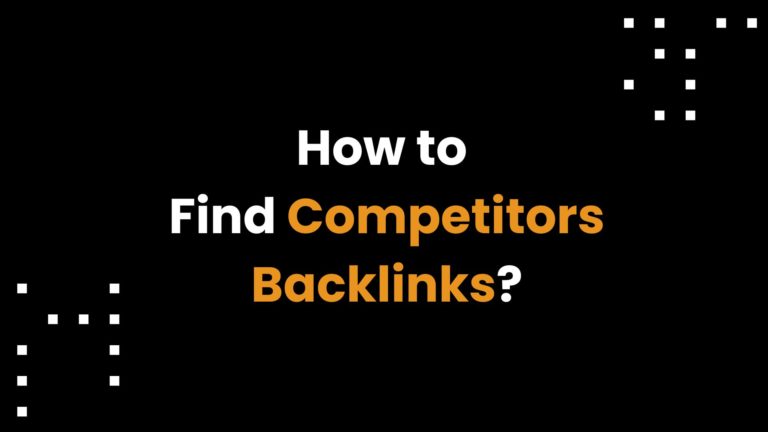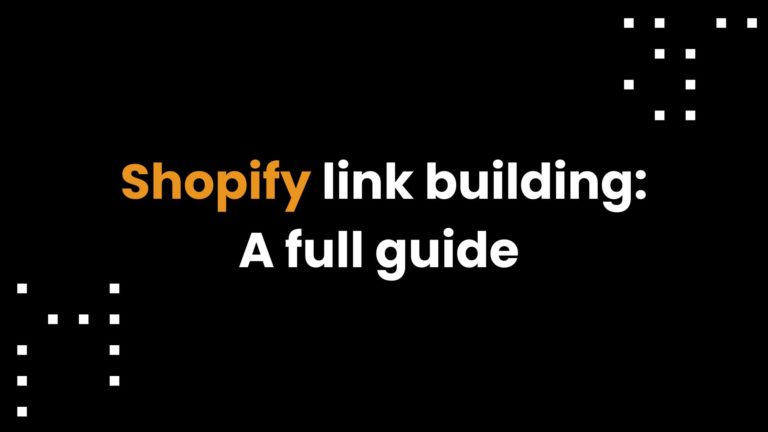What is link exchange? Is it safe for SEO? How to do it? Find out all the answers and learn the ins and outs of link exchange in this article!
What Is Link Exchange? Definition
Link exchange or reciprocal linking refers to the practice of swapping links with another domain. The idea behind it is simple – you find (or are found by) an authoritative website, contact the owner, and link to each other. As a result, both sites get high-quality backlinks. But is it so easy?
Not always. In the simplest form, only two websites are involved. However, you might sometimes find networks with more domains. In such cases, these domains don’t have to be linked together directly. For example, in a three-website scenario, domain A might link to domain B, which links only to domain C, which links to domain A. This might look similar to link farms; however, there is one major difference – all three domains in such a scenario are normal websites, ones that attract traffic and aren’t focused specifically on link building.

Types of Link Exchange
There are several types of reciprocal backlinks that one can implement. Let’s look into them now.
Private Influencer Network (PIN)
In this scenario, a group of websites works together, sharing backlinks with each other, hence promoting their content. How does this work? Here are the basics:
- Website owners start a partnership together in a group of 4 or more topi-relevant websites.
- The group supports the content within it with backlinks – not every site has to be linked directly; the connection might be indirect.
- The value of each influencer within the network rises along with the whole group.
If a PIN is discovered by Google, it might be penalized, though – it all depends on the scale of the exchange.
Swap backlinks
This is the simplest form of backlink exchange, the so-called “I link to you, you link to me.” In this scenario, two sites work together, exchanging direct links.
Guest post exchange
Guest post swapping is the same as link swapping, though it involves the whole article. Here, the owner of website A prepares an article that they publish on website B. The article contains a link to website A. This then occurs the other way around.
| TIP: While reciprocal guest posting might seem tempting due to lower costs, it still requires you to create content – you save up only on purchasing linking space. Thus, it’s often better to buy guest posting instead and have the content written and published all in one. |
3-Way Link Exchange
We’ve already mentioned an example of a 3-way link exchange before. In this scenario:
Site A links to Site B
Site B links to Site C
Site C links to Site A
Is Link Exchange Safe for SEO?
Is link exchange safe? Let’s pull out our favorite “it depends” card. Why? It all goes down to slightly ambiguous guidelines provided by Google. According to the tech giant, links qualify as spam in cases of
Excessive link exchanges (“Link to me and I’ll link to you”) or partner pages exclusively for the sake of cross-linking. (Google Search Essentials)
The word “excessive” is key here – it means that you can exchange links as long as it does not occur on a large scale. This is due to the fact that even fully natural links might look like exchanges – when operating within a certain industry, you are likely to link to a particular site in some content pieces, while the site is likely to link to you in its own content. Hence, as long as you don’t abuse link exchange, you can use it as a part of your strategy.
| While link exchange might be safe if you don’t overdo it, it shouldn’t become your main link building strategy. Instead, focus on other, safer, and more effective methods, and treat reciprocal backlinks as an additional effort that helps you get even more link juice. |
How to Exchange Backlinks? Link Swap as a Link Building Strategy
Let’s say you know that you want to add link exchange to your link building campaign. How do you do this to avoid getting penalized by Google? When should you do this in the first place? Here are all the answers!
When Is Getting Backlinks Through Exchange Worth It?
While you probably get tens, if not hundreds, of link exchange offers, they aren’t always worth it. The truth is, there are several conditions that your partner needs to meet for the link swap to be beneficial for you, namely:
- The site(s) you’re partnering with are relevant to your content,
- have high domain authority/rating,
- have a decent monthly organic traffic (at least 5k),
- has been live for a few years already.
Naturally, in some special cases, not all of these conditions need to be met. For instance, if you’re aiming for #1 with a particular keyword and you’re close to your goal, you might go for a link exchange with a partner who offers a great opportunity for the particular anchor phrase, even if they don’t have stunning organic traffic numbers.
| TIP: Be wary of sites that have high DA/DR scores but little-to-no traffic or high reciprocation rates – these might be link farms or excessive link swappers, which will do more harm than good to your site’s rankings. |
How to Swap Links?
How to swap links safely? As mentioned before, don’t use it as your main strategy, and don’t overdo it. Apart from that, there are some other best practices.
- Compare your exchange rates with those of your competitors in the same industry to ensure that you don’t swap links excessively.
- Don’t exchange links between the same content – it’s visible and shady. Instead, if you’re linking from your article A to your partner’s article B, ask them for a link from their article C to your article D.
- For every link exchange, acquire several links through link exchange – you’ll avoid overdoing it.
| Communication in a link exchange is important. If agreeing on the deal takes too much time, the strategy won’t be effective, even if you get extremely high-authority backlinks. |
Effective and Safer Alternatives to Link Exchange
While backlink exchange might be a helpful strategy (though risky), and most websites use it to some extent, it’s not the most effective one – there are simply better and safer ways to acquire authoritative links, ones that are often safer. What are they? Here are a few examples.
Buying Links on a Marketplace
Firstly, you can use platforms that enable you to buy links. For example, our Link Building Marketplace offers you link building opportunities from over 75000 domains in several languages. Seems like much? Don’t worry, you can use more than 60 filters to limit the results and find the best links for your site.
| Don’t know which links to choose? Check our link building tool, the Link Planner, and see how it can help you schedule and carry out your campaign. |
Get Backlinks with Great Content
The better your content, the more users will link to it. So, while acquiring links directly is still a must, you can get some link juice with excellent articles, infographics, and charts shared by your users.
Outreach
Outreach is yet another effective way to gain more links, and you need to perform it anyway if you want to exchange links. So, if somebody does not agree to a swap, discuss the conditions for publishing your backlink instead.
Market Your Content
In an ideal world, it would be enough to write your content and let users access it through organic searches. In practice, it’s not that easy – sometimes, you need to promote your content for it to become truly popular, attract attention, and finally get backlinks. This is why you should market your best articles and research on your social media or even in adverts – the more users learn about them, the higher the chances that they will link to them.
Reclaim Lost Links
If you monitor your links and see that they have disappeared, it’s time to contact the website owner. After all, the loss of the link might be the result of a mistake, so talking to the owner might help you get it back.
The same goes for unlinked mentions of your brand or articles. If you see them, react and get those links.
The Takeaway
Link exchange is a topic that divides the SEO community. On one hand, Google does not directly forbid it; on the other, it doesn’t allow it directly either. This is why, although most sites do use backlink exchange, they don’t base their efforts purely on it, and neither should you. After all, there’s a thin line between normal and excessive link reciprocation, and any unnatural behaviors could still be flagged as spam by the algorithms.
FAQ
Is a backlink exchange program safe for my blog?
A backlink exchange program can be safe if done correctly. Avoid excessive exchanges and follow webmaster guidelines to ensure compliance with search engines.
What are the best practices for a guest post swap?
For a successful guest post swap, choose a blog in your niche, create high-quality content, and ensure both parties link to each other’s content naturally. If you prefer a safer approach, consider using Linkhouse for quality backlinks.
How can I find link exchange opportunities that are safe for my website?
When looking for link exchange opportunities, it’s crucial to partner with reputable websites that have high domain authority and relevant content. Avoid engaging in link schemes that could be penalized by search engines.
What should I consider when I want to exchange links with another site?
When considering a link exchange, evaluate the potential partner’s web traffic, domain authority, and relevance to your content. It’s important to avoid excessive backlinks exchange to prevent being flagged as part of a link scheme.
Utilizing a professional service like Linkhouse Company can help you navigate link building process by connecting you with credible websites and ensuring your link are beneficial.
How do link exchanges work to improve search engine rankings?
Link exchanges work by allowing websites to link back to each other, increasing visibility and authority in search engines. Ensure exchanges are relevant and not excessive to stay within webmaster guidelines. Alternatively, use Linkhouse to find reliable backlink opportunities.








